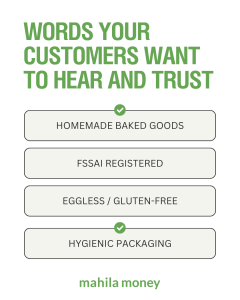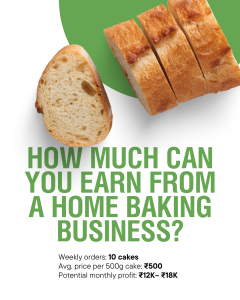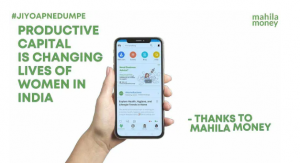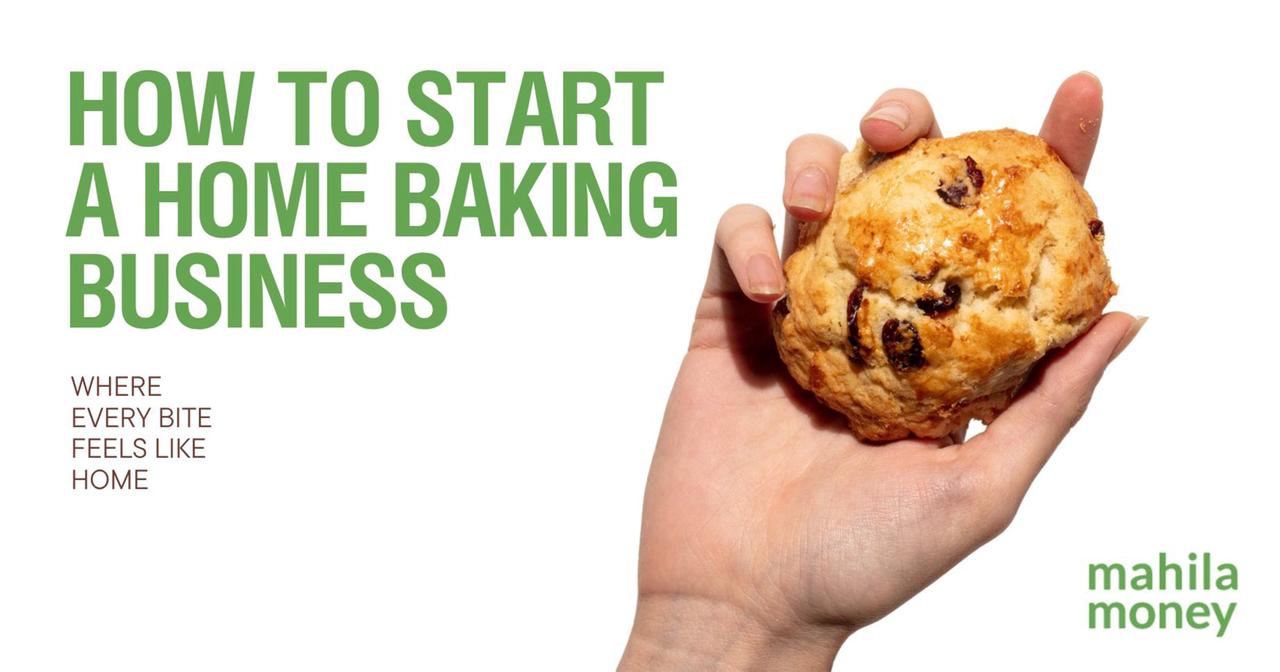When Toinali started baking cakes in her home kitchen in Mizoram during the lockdown, she had no idea it would grow into a steady side income. What began with one chocolate cake order from her neighbour quickly turned into a regular stream of birthday and festive orders. Today, Toinali runs her own home baking business, manages her orders on WhatsApp, and has even used a small Mahila Money loan to expand her shop.
If you’re wondering how to start a bakery from home or how to turn your love for baking into a source of income, this guide is for you. Starting a home baking business doesn’t require a big shop or a massive investment, just the right ingredients, a plan, and the willingness to get your hands a little floury.
Apply For a Business Loan
The Rise of Home Bakers in India
In the last few years, India has seen a quiet but significant shift in the baking industry led by women, driven by Instagram, and fuelled by changing consumer tastes.
The Indian bakery market size reached USD 13.8 Billion in 2024. Looking forward, the market is forecast to reach USD 31.5 Billion by 2033, exhibiting a growth rate (CAGR) of 9.12% during 2025-2033, with a huge demand surge in artisan and home-style baked goods. Post-pandemic, more people are choosing eggless, gluten-free, vegan, and millet-based treats over mass-produced ones.
Why Start a Home Baking Business
With platforms like Instagram, WhatsApp Business, and local delivery partners, it’s easier than ever to run a profitable home baking business from your kitchen. With minimal investment, often under ₹25,000, many women have started earning between ₹10,000 and ₹50,000 per month through customised cakes, cookies, cupcakes, and festive bakes.
The demand for homemade, preservative-free, and customised baked goods has grown rapidly in India. Customers today want fresh baked goods with personal touches, eggless cakes, healthy millet cookies, vegan brownies, and festive cupcakes, and they’re willing to pay for quality.
For many women, especially homemakers or young mothers, a home baking business offers flexibility, creativity, and financial independence without leaving the house. It also keeps costs low, since you use your existing kitchen space and don’t need to hire staff in the beginning.

7 Steps to Start a Home Baking Business In India:
Step 1: Get Your Recipes and Menu Right
The first decision in launching a home baking business is identifying what makes your baking stand out. This isn’t about copying trending cakes from Pinterest; it’s about combining your personal strengths with what the local market wants. For instance, if you’ve always been the go-to person for gooey brownies or millet cupcakes in your building, that’s your starting point.
Spend time understanding what flavours, ingredients, and price points appeal to your audience. Talk to your neighbours, ask your children’s school WhatsApp groups, or observe what people are gifting during festivals. Are customers seeking healthy baking options, eggless cakes, sugar-free cookies, or simple, nostalgic treats like nankhatai and mawa cake? Starting with a limited menu of 4–5 items helps you stay consistent and build trust. And yes, test everything – shelf life, transport safety, taste after 24 hours before you accept your first paid order.
Step 2: Set Up Your Kitchen for Small-Scale Production
Your kitchen doesn’t need to look like a commercial bakery, but it should function like one. Setting up a clean, dedicated space is essential, not just for hygiene, but also for efficiency. Most home bakers start with an OTG or convection oven (20–30 litre), a digital weighing scale, and essential tools like cake tins, spatulas, and piping bags. What matters more than quantity is consistency, using the same quality of butter, flour, and packaging ensures each batch meets the same standard.
If your fridge space is shared with daily household groceries, consider allocating a shelf solely for baked items and raw materials. It helps maintain hygiene and avoids cross-contamination. Keep your tools clean and organised, label ingredients with expiry dates, and if you’re handling both vegetarian and non-vegetarian products, be very clear in your process flow and communication.You don’t need a fancy kitchen to begin.
A clean, well-organised corner of your home kitchen is enough to run a home baking business.
Here are the basics you’ll need:
- An oven (OTG or convection microwave)
- Baking trays and cake tins
- Measuring cups, spatulas, mixing bowls
- Hand or stand mixer (optional but useful)
- Weighing scale
- Airtight containers for ingredients
- Refrigerator space for storing creams or frostings
Step 3: Understand FSSAI Registration for Home Bakers
One of the most common questions new bakers ask is: Do I need an FSSAI license to run a home baking business? The answer is yes, but it’s easy to get.
Even if your turnover is under ₹12 lakhs a year, a basic FSSAI registration adds a layer of professionalism and builds customer confidence. Plus, it’s legally mandatory if you’re selling food.
The application process on the FSSAI website is straightforward, requiring documents such as your Aadhaar, address proof, and a list of products. Once approved, you’ll get a 14-digit FSSAI number that should be mentioned on your product labels. Having an FSSAI number builds customer trust. You can add it to your packaging and social media handles to give a more professional appearance.
Basic documents required for FSSAI license:
- Aadhaar/PAN card
- Passport size photo
- Proof of address
- Details of your product list
Step 4: Pricing Your Baked Goods
Pricing is often challenging for new bakers. Many tend to undercharge. Here’s a simple way to start:
- Add the cost of ingredients + packaging
- Add a portion of your electricity and labour time
- Multiply by 2.5 to 3 to set a selling price
For example, if a chocolate cake costs ₹150 in materials and effort, price it at ₹400–₹450. Over time, you’ll understand what works in your market.
A home baking business can offer 30–50% profit margins, especially during festive seasons or wedding orders.

Step 5: Marketing and Taking Orders
You don’t need a website on Day 1. Start with:
- WhatsApp Business (with a catalogue)
- Instagram or Facebook page (upload good photos)
- Local housing groups and word-of-mouth
Ensure your photos are well-lit and clear. Add short videos or reels of your baking process – they build trust and attract more orders.
You can also participate in local exhibitions, flea markets, or community stalls. In time, consider listing your home baking business on platforms like Zomato Home Chef or Swiggy Minis (available in select cities).
Step 6: Packaging and Delivery
Don’t overlook the appearance of your product when it reaches the customer. A simple but neat box, a thank-you card, and your logo sticker can go a long way. If you’re delivering cupcakes or cookies, ensure the packaging can handle transport in Mumbai monsoons or Delhi heat. Mention storage instructions, FSSAI number (once registered), and allergy warnings clearly.
This is especially important as customers become more aware and discerning. If you make nut-based or gluten-free products, always add disclaimers. Clear labelling not only protects you but builds trust — a must-have when you want your home baking business to scale.
If you’re delivering locally, tie up with Dunzo – a hyperlocal delivery platform or use a family member for short-distance delivery. Always make sure your items are packed to avoid smudging or damage in transit.
Good packaging can help your home baking business stand out and encourage repeat orders.
Step 7: Keep Improving and Expanding
Once you get 15–20 regular orders a month, you can think about expanding. This could mean:
- Investing in a bigger oven
- Hiring a helper
- Adding new items to your menu (healthy bakes, festive gift boxes, return favours)
- Learning cake decorating skills
You can also apply for small business loans through platforms like Mahila Money. Many women bakers have used these loans to buy better equipment, upgrade packaging, or even move into a dedicated baking room in their homes.
Final Thoughts: Start Small, Bake Big Dreams
Your home baking business doesn’t have to be perfect on Day 1. What matters is that you start. Take that first order, test your recipe, take feedback, improve, and keep going.
Every cake, every cookie is not just a product – it’s a connection with a customer who trusts you. And over time, that trust turns into income, stability, and pride.
“It’s not just about baking anymore. It’s about building something of my own,” says Toinali, smiling as she pipes chocolate ganache onto her bestseller cake. Read her full story here
Read more:
How to Start a Candle Making Business from Home in India with Just ₹5,000
How to Start a Jewellery Business Online in India: A Step-by-Step Guide for Women Entrepreneurs
How to Start Your Beauty Brand from Home: 10 Essential Steps
How to Start a Cotton Bag Manufacturing Business in India

If you are a woman entrepreneur who wants to take your business to new heights and is in need of working capital and entrepreneurship resources, come speak to us on Mahila Money. For more such #JiyoApneDumPe live conversations, download the Mahila Money App on Play Store or visit us on www.mahila.money.





Starting a home baking business always felt overwhelming, but this blog broke it down so simply.
Thank you for making it feel doable and real.
Excited to finally turn my passion for baking into something bigger! 🍰💫
Very nice article, just what I wanted to find.